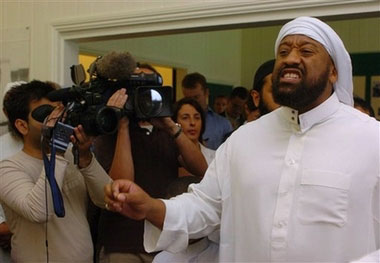Getting the freedom of speech balance right.
 There's little doubt that Abu Izzadeen, also known by his rather less exotic moniker of Trevor Brooks is an odious, rabble-rousing racist determined to stir up trouble and hatred. In his involvement with al-Muhajiroun and its successor organisations, which have now become so disconnected from the original group that's it difficult to know exactly which is still active and which have been abandoned (its current incarnation might be Ahlus Sunnah wal Jamaah), there's little doubt that he's been involved in radicalising individuals that find such an all encompassing and explanatory ideology both attractive and easy to understand. His conviction for funding terrorism quite clearly shows that he cared little for the innocents, disparagingly referred to as the "kuffar" that are inevitably caught up in the attacks that take place in both Iraq and Afghanistan, which is presumably where the money was heading.
There's little doubt that Abu Izzadeen, also known by his rather less exotic moniker of Trevor Brooks is an odious, rabble-rousing racist determined to stir up trouble and hatred. In his involvement with al-Muhajiroun and its successor organisations, which have now become so disconnected from the original group that's it difficult to know exactly which is still active and which have been abandoned (its current incarnation might be Ahlus Sunnah wal Jamaah), there's little doubt that he's been involved in radicalising individuals that find such an all encompassing and explanatory ideology both attractive and easy to understand. His conviction for funding terrorism quite clearly shows that he cared little for the innocents, disparagingly referred to as the "kuffar" that are inevitably caught up in the attacks that take place in both Iraq and Afghanistan, which is presumably where the money was heading.What I'm not convinced of is that his speeches at the Regent's Park mosque, apparently recorded and which extended to up to 5 hours, for which he was convicted of inciting terrorism, ought to have broken a free society's laws protecting freedom of speech. The excerpts which have been released and transcribed are inflammatory, condemnable, offensive and in some places laughable, but not in my personal view ones which should be considered so dangerous as to warrant over a four year sentence. While the jury would have seen everything unexpurgated, very little of what was said which we have been allowed to see is outside the norm of jihadist propaganda easily available on the web, and when compared to some of the anti-Muslim hate which far-right blogs and anti-jihadist sites carry, it even seems to be somewhat on the mild side. This is in no way to justify or apologise for what Izzadeen and others like Simon Keeler stand for or indeed argue for, but these are the sort of individuals who appear to be potentially more dangerous inside prisons, where it is next to impossible to suitably monitor their activities, than they are outside, especially when they, like many of the other hot-heads out there, have no intention of personally carrying out the threats which they find it so easy to make. They leave that to the others that are more easily moulded and whom don't enjoy the sound of their own voice as much, as the judge himself pointed out in Izzadeen's case.
That's why it's so difficult to take the manufactured level of outrage in the Sun over Brooks "only" getting four and a half years, not apparently noticing that he also received two years and three months for funding terrorism. Brooks' hatred was nowhere near on the levels of the speeches given by Abu Hamza, who received 7 years, which makes it all the more tedious for the paper to be making the point that he could have been imprisoned for "life", a sentence which in other circumstances it also sneers at. The ultimate risk from cracking down too hard on such rants is that it spills over into the grounds of prosecuting on the basis of offence rather than because the views expressed are dangerous; while that hasn't happened yet, it's a potential worry, especially when such sentences are condemned as being "soft".
I could well be wrong, and some will argue, with some justification, that not prosecuting those such as Brooks doesn't just leave all of us in danger, but that it especially leaves Muslims themselves open to reprisals, or to the claims of others that they're not doing enough to condemn the agitators in their midst. The one bright side is that there seem to be increasing numbers of those formerly involved in radical Islam turning against their past doctrines and going public, helping others also to mend their ways. Rachel reports that Attila Ahmet, one of those recently sentenced for soliciting murder and the self-styled "emir" of the "paintball jihad" group, has apparently renounced his radicalism in Belmarsh, and has been moved to the hospital wing as a result for his own protection. Anne Owers, the prisons inspector, recently praised the imams at Belmarsh for their work in countering radicalisation, the opposite of what some tabloids had been claiming was taking place. His example and that of others like Hassan Butt show the way forward, but imposing ridiculously harsh sentences for questionable rants, as well as further extending the detention limit for "terrorist suspects" will only make their good work all the more difficult.
Labels: Abu Izzadeen, al-Muhajiroun, freedom of speech, Islamists, jihadists, terror, terror laws, terror suspects, war against bullshit

